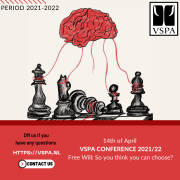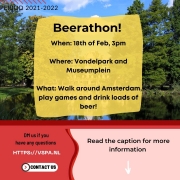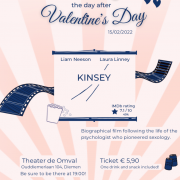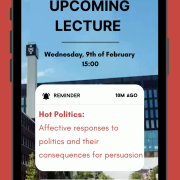Free Will – So You Think You Can Choose
Link to tickets: https://vspa.nl/product/free-will-so-you-think-you-can-choose/
Do you think that we are really free to choose our actions? Or is there something that inevitably determines them?
If you ever asked yourself these questions, the annual VSPA conference “Free will: so you think you can choose?” is here to tease your brain!
Our excellent speakers will offer you answers to these questions and to many more, such as:
– Is free will an illusion when we look at human neurophysiology?
– Should we hold criminals accountable in court if their free will is compromised by biological changes?
– Does advising, persuading, blaming and praising even have a point if we deny free will?
Interested in knowing more? Check the details below!
When? 14th April 2022, from 15:00 to 20:30
Where? Lecture hall A1, Building A, Roeterseiland Campus
Bonus: You will gain 2 colloquium points!
COLLOQUIUM POINTS
2 colloquium points will be awarded for attendance to all three lectures.
1 colloquium point will be awarded for attendance to only one or two lectures.
Attendance will be registered through a form at the end of each lecture.
PARTIAL ATTENDANCE
You are welcome to take part in only one or two lectures, however, the ticket price for the event will remain the same. The number of colloquium points awarded will also differ based on the number of lectures you plan to attend (see above).
Plan of the day
15.15 – 17:00
Dr. Emilie Caspar, Ghent University.
How Can Humans Commit Atrocities When They Follow Orders? A Social Neuroscience Perspective of the Obedient Brain.
In this talk, I will explore the question of how humans can commit atrocities when they follow orders. I will present recent studies in social and cognitive neurosciences, which showed how obeying orders impacts the sense of agency and empathy for pain. We will also review some studies involving military staff and inmates to understand how working or living in an environment that reduces personal autonomy impacts the sense of agency, even when one is free to decide which actions to execute.
17.15 – 19.15
Mr. dr. Johannes Bijlsma, Utrecht University.
Free will and the insanity defense in criminal law: the Bart van U.-case
Criminal responsibility presumably requires that an offender acted out of his/her free will. We do not want to punish offenders who could not have acted otherwise. It is assumed that in certain cases a mental disorder causes an offender to commit an offence not out of free will. In such a case, a defendant is acquitted by reason of insanity. In the (in)famous Dutch criminal case against Bart van U. – who killed a former health minister and his own sister while he was psychotic – the question of the criminal responsibility of the offender was at stake. Using this case as an illustration, the relation between the insanity defense and freedom of the will will be explored. Is freedom of the will in fact a requirement for criminal responsibility? Is it because a lack of freedom to act otherwise that we do not hold certain mentally ill offenders responsible, or is it because of other reasons? Can a philosophically contested issue like freedom of the will provide a guideline for a judge to assess criminal responsibilty? Are forensic mental health experts able to “measure” the degree of free will with which a mentally ill offender acted?”
19.30 – 20.30
Dr. Sebo Uithol, Leiden University.
Free will and where our actions come from
The question of free will is an ancient one, and the answer options are well-known: determinism, libertarianism, and compatibilism. Yet, the first seems undesirable, the second unlikely, and the third problematic. The problem is our intuitions about where our actions come from. In this talk I will discuss theoretical and empirical work that shows that our folk psychological model in which intentions cause actions is unlikely to hold on the level of neural processes. Rather, our action decisions emerge from a causal web that spans multiple brain regions, and even includes the body and the environment. Appreciating the distributed and dynamic origins of action decisions may push us towards a form of compatibilism.













